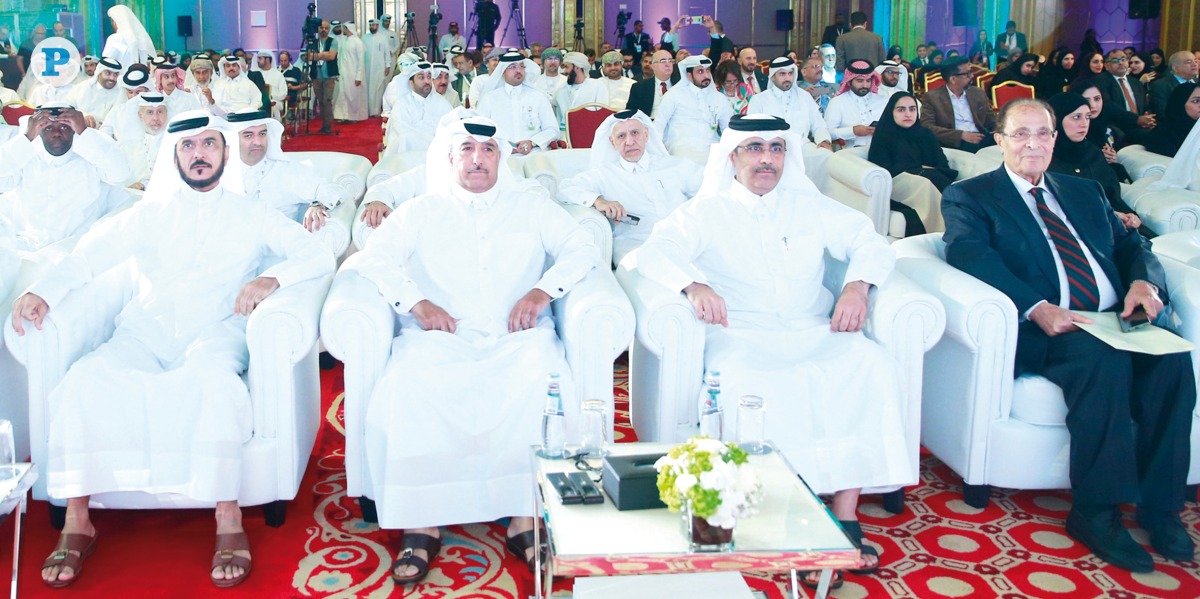President of Kahramaa Eng. Essa bin Hilal Al Kuwari (second right), Chairperson of Board of Directors WSTA Eng. Abdelrahaman Mohamed Almahmoud (left), and President, AWC Dr. Mahmoud Abu-Zeid (right) with other officials at the opening of the 15th Gulf Water Conference in Doha yesterday. Pic: Rajan Vadakkemuriyil / The Peninsula
Doha, Qatar: Qatar has achieved the indicators of Sustainable Development Goal (SDG) 6 on water and sanitation by ensuring the access to clean water and sanitation for all in the country, said Kahramaa chief.
SDG 6 envisions “clean water and sanitation for all”. It is one of the 17 SDGs established by the United Nations General Assembly.
“The latest international technologies are being applied in water desalination plants, including reverse osmosis technology, which currently contributes to the production of approximately 30 percent of the country’s desalinated water, which has significantly improved the efficiency of water use,” said President of Qatar General Electricity and Water Corporation (Kahramaa), Eng. Essa bin Hilal Al Kuwari.
He was addressing the 15th Gulf Water Conference under the theme “Water in GCC: Embracing Technological Progress” in Doha yesterday. The three-day event is being organised by Kahramaa in coordination with Water Sciences and Technology Association (WSTA). “In order to cover the growing demand for water due to the comprehensive renaissance that the country is witnessing under the leadership of Amir H H Sheikh Tamim bin Hamad Al Thani and the wise government at all levels, we are working to ensure the presence of a spare production capacity of no less than ten percent, while following best practices in global energy efficiency provision,” Al Kuwari said.
He said the total water resources amounted to about 1,155 million cubic metres during 2022, of which desalinated seawater constituted 56 percent, and the rest was shared by groundwater and treated wastewater.
“With regard to water recycling, we are keen to follow the best methods in the treatment of wastewater, as approximately 75 percent of it is optimally used in the fields of irrigation, agriculture, cooling, and others. We are also working to implement the latest water use efficiency standards in all sectors and raise awareness about its rationalisation, regulations and technology.
“This is in line to achieve the goals of water security policy and water strategy for Qatar, which are compatible with Qatar National Vision (QNV) 2030 of achieving sustainable development, which was established by the Third National Development Strategy,” Al Kuwari said.
He said efforts by the Permanent Committee for Water Resources since its establishment in 2007 have contributed to many achievements.
“The most important of which is what was accomplished in 2020 and the completion of the preparation of the water security policy and water strategy for Qatar until 2030, which included five basic elements related to integrated governance, smart infrastructure, sustainable ecosystem, demand side management, fit-for-purpose quality management, and innovation,” said Al Kuwari.
He said Qatar, like other countries, faces a number of challenges, including the scarcity of fresh groundwater due to the lack of enough rain and the use of large quantities of groundwater for the consumption of voracious crops, including fodder cultivation, which necessitated the expansion of the treated water sector using advanced technology, following the best international practices, and setting priorities for its use.
“The water security is an urgent challenge for the world, and climate change increases this challenge. We find that only about 2.5 percent of the water on the Earth is fresh water suitable for human consumption,” said Al Kuwari. He said the largest source of fresh water, which is groundwater, faces the dangers of lack of protection or overconsumption.
Addressing the event, Chairperson of Board of Directors of WSTA, Eng. Abdelrahaman Mohamed Almahmoud said the conference is to keep pace with modern technology, given the increasing importance of technology in raising the efficiency of the water sector and enhancing its level of sustainability.
He said GCC countries are pioneers in technological developments and adopting the latest and most appropriate ones to raise work standards, whether in terms of water production, quality, transportation and distribution, or in methods of rationalising its consumption.
“Given that the GCC countries represent the highest number in seawater desalination production, they are at the forefront of the world’s regions in this field, with a percentage of more than 40 percent of global production,” said Almahmoud.
He said it was necessary to pay attention to aspects of research, studies, desalination methods, and the complex details that follow until the moment the water reaches its maximum suitability for consumption. “Also in the field of using modern technologies in irrigating crops and in treating wastewater from various sources in order to make it suitable for use in various aspects, and the necessary quality control processes and setting standard specifications.”
President of Arab Water Council (AWC) H E Dr. Mahmoud Abu-Zeid said the conference is an opportunity to exchange ideas and experiences on how to reach this common goal.
“During the conference, several main topics related to the challenges of water management in the GCC region will be discussed, all of which related to the integrated management of water resources, including expanding the use of non-traditional water resources, developing water conservation policies, improving its quality, and promoting innovation in the water sector,” said Abu-Zeid.
General Secretary of Arab Countries Water Utilities Association (ACWUA), Eng. Khaldon Khashman and Dr. Hammou Laamrani from United Nations Economic and Social Commission for Western Asia (ESCWA) also addressed the opening session.
Read the full article here




















